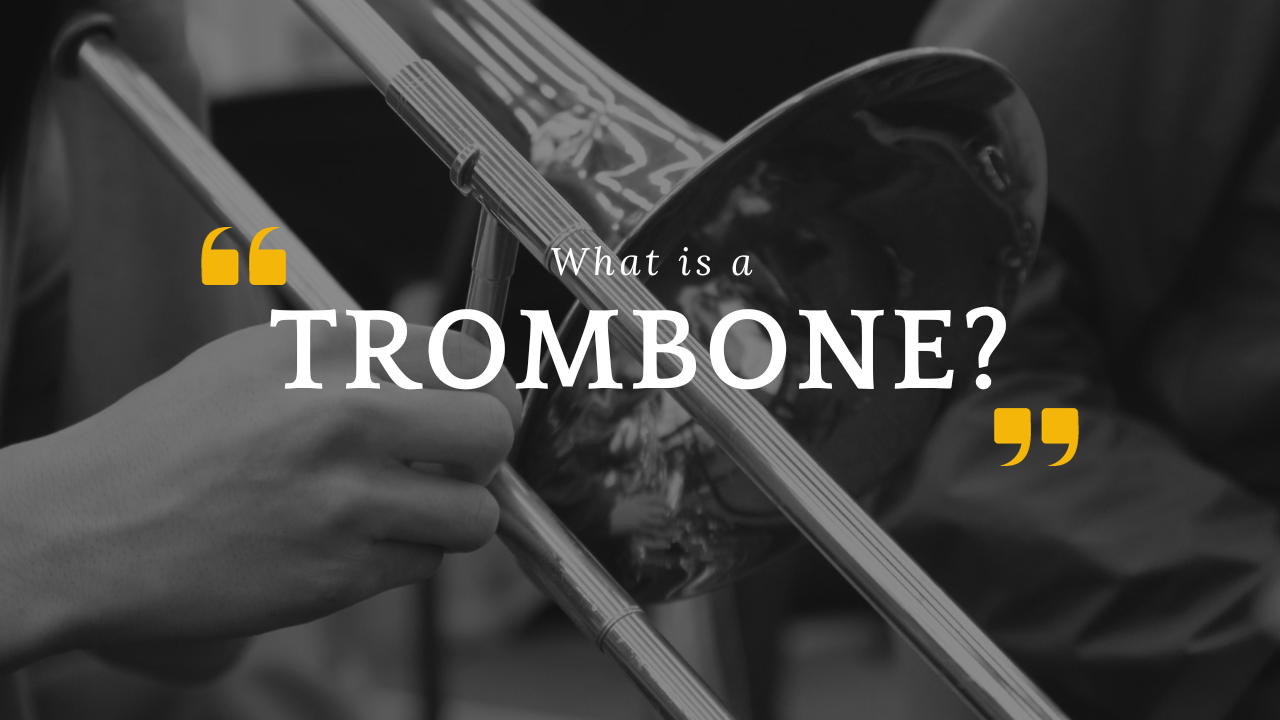The minimalist design of the trombone may make you mistakenly think that this instrument is very simple; however, it’s not so. To learn how to play the trombone, you might need much time and dedication since it’s very complex. For those who are interested in this instrument from the prospective of aspiring trombonists, brass instruments lovers, or just curious persons, we prepared a list of 10 most frequently asked questions about the trombone.
1. What family does the trombone belong to?
The trombone belongs to the brass family of musical instruments together with a trumpet, and tuba. All representatives of this family share the same peculiarity in their construction, which is the brass alloys. Apart from that, they all produce sounds in the same way by vibrating the musician’s lips into the mouthpiece.

2. Who invented the trombone?
3. Are all trombones fully made of the brass alloys?
The most common material for producing these instruments is brass alloy; however, some components of them, for instance, the bell sections, often differing in colors from the rest of the components, may contain copper and zinc. The slide could be made of brass of various colors: yellow, gold. Sometimes for inner slides, nickel silver is used. The outer surface may incorporate various finishes: lacquering or silver plating. They contribute to the aesthetic purposes and protect the brass from oxidation.
4. What is the range of the trombone?
A tenor trombone, pitched in B♭, usually ranges from E2 to F5. The extra section of tubing extends the lower range down to B♭1. Bass trombones with the same B♭ pitch can deliver the range of F1 to C5. Some bass models can sound even lower.
5. What strengths does playing the trombone demand from musicians?
Strengthening and the need to control the mouth muscles are the main challenges that the trombonists face at the start of their musical journey. Moving the slide in and out demands a well-trained technique. You can’t do it quickly until you have years of practice. Musicians also need to train their ears to be able to play in tune. What makes this instrument a bit easier to play than others from the brass family is intuitive chromatics. You needn’t memorization since notes are next to each other in sequence.

6. What music genres are most popular for the trombone?
The trombone takes an important part within brass, and jazz bands. Especially this instrument is popular within Dixieland jazz, New Orleans brass music, swing, bebop, ska, reggae. It also remains the key member of the brass section in classic, so you can hear its majestic sounds in orchestral compositions, symphonies, and chamber music. Trombones are used in funk and soul music, where they add a punchy brass sound and contribute to the rhythmic elements of the genre. In Latin music and salsa, the trombones provide powerful brass accents, cutting through the rhythm and emphasizing the energetic nature of these genres. Although it’s not a common situation, trombones can be also present in certain rock and pop compositions.
7. What key is the trombone pitched in?
The key varies according to the type of the instrument. The tenor trombone is pitched in B♭. With the F attachment, they can reach even the key of F. Bass trombone is also pitched in B♭. The contrabass trombone is pitched in the key of F and has two valves in different tunings. Alto trombone, pitched in the key of E♭, could have a valve that switches it to the key of B♭.
8. How much time is needed to learn to play the trombone?
It depends on a few factors such as your personal intention or motivation, prior music experience, including the ability to read sheet music or playing other brass instruments, your age, and time you can devote to the practice. The progress also depends on how steady and consistent you can learn and under whose supervision you do it. In fact, you need the support of a good teacher with expertise in trombone to help you learn more effectively.

9. Does the trombone go out of tune, and how often does it happen?
It could go out of tune due to many factors. Like any brass instrument, the tuning stability of the trombone is influenced by temperature and humidity. The changes in temperature can cause the metal to expand or contract that results in changes in the pitch. Since it doesn't have valves like the trumpet or French horn, musicians change pitch by using the slide. Inexperienced players may face some problems with maintaining accurate intonation, so the player’s technique also matters. Instrument quality itself could influence the tuning stability, and in terms of intonation, the high-quality trombones are more stable. And of course, you need to establish a regular maintenance routine, including lubricating the slide, to keep your instrument in optimal conditions.
10. What accessories do I need to maintain the trombone in proper condition?
You need a quality slide oil to help such a fundamental part of the instrument move smoothly. Slide grease is also needed for friction prevention and easy navigation of the slide. Consider buying a cleaning kit, including a brush for cleaning the inside of the tubing and a soft care towel for the exterior to remove debris and moisture. A mouthpiece brush helps keep the mouthpiece clean and free from bacteria. Since every musician moves from home to school or rehearsal room, a sturdy case or bag is also crucial. It can shield the trombone during transportation from dents, shocks, and temperature changes.





 https://kgumusic.com/pages/about-us
https://kgumusic.com/pages/about-us
1 comment
Great article! If anyone wants to listen or learn more about the trombone you may enjoy my recent TEDx Talk or Online Courses.
TEDx TALK “Trombonology”
https://youtu.be/blWblHx18gM?si=9kUutVGEvscW1aip
ONLINE COURSES “Trombonology”
https://elektrohornz.com/courses